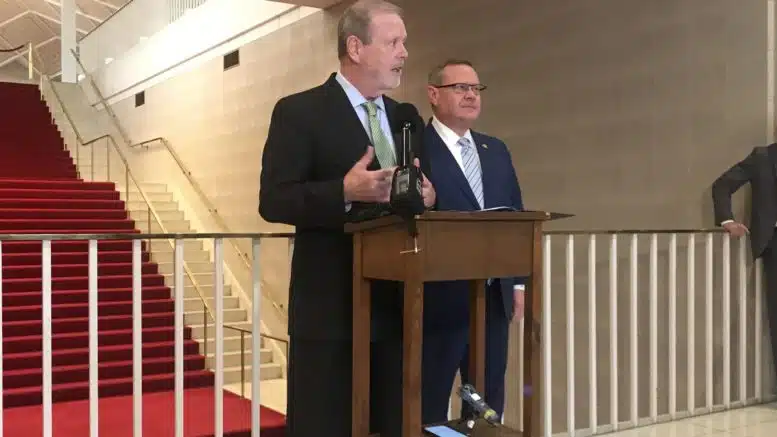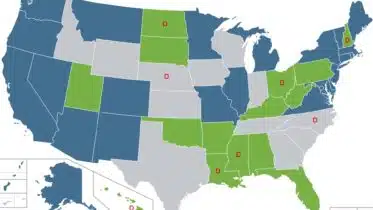By Jaymie Baxley and Rose Hoban
Statehouse leaders have finally announced a budget deal, which will fund the state and also allow for Medicaid expansion to go into effect in coming months.
For weeks, leaders in the Senate and the House of Representatives tussled over the issue of adding legalization of casinos into the $30 billion state budget. Senate leader Phil Berger (R-Eden) was all in on the casino proposal, which would have won one of the four proposed casinos for his home in Rockingham County.
Berger had argued that a new casino in Danville, Virginia, was drawing North Carolinians — and their dollars — across the state line. He said those were dollars that North Carolina could keep at home, along with the tax revenue they generated.
“That money that is being spent in Virginia is still largely coming from North Carolina — and will continue to do so,” he said.
But in the end, the casinos proposal did not have enough votes on either side of the aisle to make it into the budget bill. Two weeks of negotiations made it clear that dozens of House Republicans — members of the conservative Freedom Caucus — would not vote for a budget that included casinos. Democrats also said they were not willing to greenlight the casino proposal.
As late as mid-afternoon on Tuesday, Berger continued to make the argument for casinos. But in a remarkable reversal, Berger appeared with House Speaker Tim Moore (R-Kings Mountain) Tuesday evening to say that the casinos proposal would not be in the budget and that by the end of this week the budget would become law.
“The emotion that was actually permeating every bit of discussion about that had sort of overtaken” the discussion about the proposal, Berger said. “I’ve learned that in an environment like that, you’re unlikely to make any progress. And so it was … it was my belief that it was time for us to just move forward.”
‘Long time getting here’
“It’s been a roller coaster,” said Abby Emanuelson, head of Care4Carolina, a consortium of organizations that have been pushing for Medicaid expansion for nearly a decade.
“We were hopeful that the House and Senate would come back together for a deal based on the commitment they made six months ago. I’m glad that with the enactment of a budget that we are finally going to have Medicaid expansion.”
Once enacted, it’s estimated that some 600,000 additional state residents will receive health coverage through Medicaid.
Even if the budget is approved by Gov. Roy Cooper, state Health and Human Services Secretary Kody Kinsley estimated earlier this month that his department would not be able to add newly eligible residents to the rolls until December at the earliest.
The impasse over casinos helped delay the budget beyond a Sept. 1 deadline that would have allowed for expansion to take effect as early as October, Kinsley told reporters at that time.
“I am very pleased with the final agreement even tho it was a long time getting here,” Rep. Donny Lambeth (R-Winston-Salem) texted to NC Health News.
Lambeth, a former hospital president, was one of the few Republicans who championed Medicaid expansion years before the rest of his caucus got on board.
“Not only is Medicaid Expansion important to some of the most vulnerable citizens, the benefits we can take advantage of from the federal funding are significant,” he continued. “Major investments in mental health reform that increases access to persons who need services not boarding in an Emergency Room waiting for treatment. This will be a significant investment to help NC address this crisis across the state. In addition the investments in our colleges that increases our programs to get more students trained in hard to fill positions.
“I could not be more pleased with where we are and I look forward to finishing this up.”
‘To their last 50 cents’
Lisa Franklin saw the effects of gambling addiction firsthand while working at a convenience store in one of the state’s poorest communities.
Franklin, who was the store’s assistant manager, said the business was popular among residents of Forest City, a town in western North Carolina with a per capita income of about $20,700. With easy access to video slot machines, Franklin said, players would go “back and forth spending their entire paychecks.”
“People would get down to their last 50 cents and come up to me, the cashier, asking if they could borrow two quarters because they had to have that one last pull, that one last chance to win,” she said. “Ultimately, they didn’t win.”
She said the push to tie Medicaid expansion to the passage of a bill that would have only created more gambling opportunities would “hurt people.” And the Rutherford County resident didn’t see much appetite for casinos among the mostly Republican electorate in the county.
Franklin now is among the people who need Medicaid. The 41-year-old left her job at the convenience store in April after being diagnosed with cirrhosis of the liver, a condition that is worsening because of her current lack of health insurance.
She needs a liver transplant, but a disability claim was denied. She said the high cost of her treatments and medication has put her thousands of dollars in debt. And she worried that she might have to move out of state.
“That’s not what I want to do because I love it here. I love this state. This is where my family is,” she said. “This is where I had decided to plant my roots and settle down.”
Rural health care in the budget
Franklin’s rural neighbors will see a lot of benefit from the proposed budget bill.
Late Monday, a draft version of the budget became public, giving reporters and lobbyists a look at what lawmakers had in mind for the coming year.
Included in the draft budget is a raft of benefits for rural health care, including:
- $25 million in incentives to expand a loan repayment program for providers who would work in rural areas.
- $5 million for telehealth infrastructure.
- $12.5 million to a program providing loans to eligible hospitals in rural parts of the state.
- $11.25 million to a program to train medical residents in rural areas.
The biggest benefit flowing to rural counties comes in the form of a new program that would allow UNC Health and ECU Health to collaborate on an initiative to be called NC Care. Over the coming fiscal biennium, $420 million is slated to be spent on creation of three health clinics in rural areas, including $150 million for rural hospital investment, $50 million to create a new children’s behavioral health hospital and $10 million to help the collaboration get underway.
But all of the benefits from this budget will take time, including Medicaid expansion, which won’t go into effect until December, at the earliest.
Franklin said she’s disappointed that expansion will be delayed until the end of the year “We need this now. We needed it back in March, when it was passed to begin with.”
She thought it was a good idea to nix casinos and push the budget forward; she didn’t think her community would have supported casinos. “I don’t believe it would have passed tomorrow anyways, with the casino expansion on there.”
“Now, the important thing is let’s get that budget passed,” she said. “Let’s get this Medicaid expansion enacted.”
Sign up for our Newsletter
“*” indicates required fields











